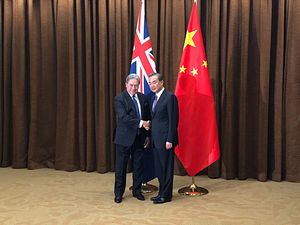New Zealand has for a long time benefited from a close relationship with China. Throughout the last decade the two countries have phased in the provisions of a free trade deal agreed to in 2008. China is now and has been for some time New Zealand’s second largest trading partner after only Australia. Exports of dairy produce, growing Chinese tourist numbers, and bolstered numbers of foreign students are all to New Zealand’s benefit.
And yet the prime minister of New Zealand, Jacinda Ardern, has not made a diplomatic visit to the People’s Republic of China. A planned trip to China was cancelled late in 2018; the reason for the sudden cancellation is not entirely clear. New Zealand has also not had Chinese top officials, like the Chinese premier or president, visit recently. Exchanges of this kind are normally regular. Does this signal that the relationship between New Zealand and China is under strain?
Late in 2018 New Zealand’s branch of the domestic intelligence service, the Secret Intelligence Service, did security sweeps looking for bugs at Canterbury University. A lecturer at the University, Anne-Marie Brady, has had a string of suspicious break ins to her home, which she claims are related to her work exposing China’s political influence in New Zealand.
In a recent article Brady published in the Journal of Democracy, she argues that “New Zealand is the target of a concerted foreign influence campaign.” She goes on to explain that “The Chinese Community Party …by coopting local elites, securing access to strategic information and resources, and manipulating public discourse” furthers its economic and political agendas. Brady also discusses members of the New Zealand parliament like Jian Yang, who had worked and studied at a People’s Liberation Army-affiliated university before leaving China in 1997. Jian Yang was part of diplomatic trips to China when the National Party was in government and received briefings from the Ministry of Foreign Affairs as part of this work.
Late in 2018 the leader of the opposition party in the New Zealand parliament, Simon Bridges, was caught out in a recording by a colleague where the two discussed accepting a large donation from a wealthy Chinese donor. The possibility that this was done in a way to prevent having to declare the donation required by campaign finance laws was discussed by New Zealand newspapers. New Zealand media outlets followed the story closely, including how this Chinese donor contributed to other campaigns of local politicians like the current mayor of Auckland, Phil Goff. Auckland is New Zealand’s biggest city.
More recently, New Zealand joined Canada and Australia in expressing concern about the Chinese company Huawei. New Zealand’s telecommunications company Spark turned down a contract to have Huawei technology as part of its new 5G network. It was later revealed that security concerns raised by New Zealand’s Government Communications Security Bureau (GCSB) was the reason why Huawei was blocked from working with Spark on this contract. Huawei had been involved in upgrading New Zealand’s 3G and 4G networks in the past.
Back in 2017 the Bureau also raised concerns that multinational IT corporations operating in New Zealand were being targeted as part of what it called a “global cyber intrusion campaign.” Later in 2018 the GCSB made clear there was evidence of a credible connection between the global campaign of intellectual property theft through cyber intrusion in New Zealand and the Chinese Ministry of State Security. All this came to light while the United States Justice Department moved to prosecute two Chinese nationals, whom they claim have had extensive involvement in intellectual property theft from American corporations.
Following the arrest of Huawei’s chief financial officer in Canada, China arrested Canadians in China, including a former diplomat. Canada claimed the detention of Canadian citizens in China was as a means of retaliation on the part of China while Beijing waits to hear whether the Huawei CFO will be extradited to the United States for trial or not. Will China move to retaliate in some way against New Zealand?
The prospect that China might in some way retaliate against New Zealand exporters to China is not clear. If it does, it will put a dampener on China’s ability to have healthy trade and foreign relations with developed countries like New Zealand. A trade war with the United States in the background and the possibility of a slowdown in China potentially make economic retaliation unlikely. China does not need another trade war and international partners to Chinese companies are likely to take note of moves to intentionally make things difficult for companies working in China.
Back in 1997, New Zealand became the first country to lobby to have China as part of the World Trade Organization and Wellington acknowledged China as a market economy in 2004. Mandarin is being taught in New Zealand schools, supported by the efforts of both countries. If diplomatic relations between China and New Zealand begin to change and have a cooling effect on trade and business relations between both countries, then both China and New Zealand will fail to benefit from investments made on both sides as part of their long-standing relationship.
Whatever comes next, it is clear that both New Zealand and China have challenges to discuss. The public in New Zealand is increasingly concerned about political influence of China in New Zealand. Chinese officials might be concerned that New Zealand maintains a foreign policy more closely aligned with Anglo-Saxon allies like the United States and the United Kingdom than China. Whether the prime minister of New Zealand will be given an opportunity to discuss the future of relations with China with key government officials within the Chinese Community Party might indicate whether New Zealand and China have finished a long honeymoon of diplomatic and prosperous economic relations or not. Only time will tell.
Christopher Edward Carroll is a postgraduate student at Massey University studying Philosophy.

































